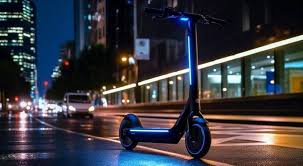In recent years, electric scooters have surged in popularity, transforming urban transportation and offering an eco-friendly alternative to traditional vehicles. As cities grapple with increasing traffic congestion, pollution, and the need for sustainable transit solutions, elektrische step legaal emerge as a practical choice for short-distance travel. This article explores the benefits, challenges, and future of electric scooters in urban mobility.
Understanding Electric Scooters
Electric scooters are two-wheeled vehicles powered by electric motors, typically featuring a rechargeable battery. Unlike their gas-powered counterparts, these scooters emit zero tailpipe emissions, making them an environmentally friendly option. They are often lightweight, portable, and easy to operate, appealing to a wide range of users, from commuters to tourists.
Benefits of Electric Scooters
- Sustainability: One of the most significant advantages of electric scooters is their reduced environmental impact. By replacing short car trips, they help decrease greenhouse gas emissions and air pollution. With the growing emphasis on sustainable practices, many cities encourage the adoption of electric scooters to help achieve climate goals.
- Cost-Effectiveness: Electric scooters are often more affordable than cars, both in terms of purchase price and operational costs. Users save on fuel, maintenance, and parking fees. Furthermore, many cities have implemented scooter-sharing programs, allowing users to pay per ride, making it accessible to a broader audience.
- Convenience and Accessibility: Electric scooters are particularly advantageous for navigating congested urban environments. They provide a quick and efficient means of transportation, reducing travel time significantly. Moreover, they can easily be parked and stored in smaller spaces, alleviating parking challenges often associated with cars.
- Health Benefits: While riding an electric scooter may not be as physically demanding as biking or walking, it still promotes outdoor activity and encourages users to be more active than sitting in a car. The act of riding can also enhance mental well-being by reducing stress associated with commuting.
Challenges Facing Electric Scooters
Despite their many benefits, electric scooters face several challenges that must be addressed for broader adoption:
- Safety Concerns: With the rise of electric scooters, safety has become a significant concern. Many riders, especially beginners, may lack experience or awareness of traffic rules. Accidents can occur, leading to injuries for both riders and pedestrians. Ensuring safety through proper regulations, user education, and designated riding areas is crucial.
- Infrastructure Issues: Many cities lack the necessary infrastructure to support electric scooters, such as dedicated lanes and proper parking facilities. Without adequate infrastructure, the risk of accidents increases, and the overall experience can be frustrating for users.
- Regulatory Challenges: The rapid growth of electric scooter-sharing programs has led to regulatory challenges in many cities. Local governments often struggle to create frameworks that ensure safety, manage public space effectively, and balance the interests of various stakeholders.
- Environmental Impact of Production: While electric scooters are eco-friendly during operation, their production and disposal raise concerns. The manufacturing process, battery disposal, and potential electronic waste must be addressed to minimize their overall environmental footprint.
The Future of Electric Scooters
The future of electric scooters appears promising, driven by technological advancements, changing consumer preferences, and increasing urbanization. As battery technology improves, scooters will likely become more efficient, with longer ranges and shorter charging times. Additionally, innovations in materials and design may lead to lighter, more durable scooters.
Moreover, collaborations between scooter manufacturers, municipalities, and urban planners will be vital in creating integrated transportation systems. As cities prioritize sustainable mobility solutions, electric scooters can play a significant role in reducing reliance on cars and promoting environmentally friendly transit options.
Conclusion
Electric scooters represent a transformative force in urban mobility, offering a convenient, cost-effective, and sustainable transportation solution. While challenges remain, the continued evolution of electric scooters, coupled with supportive policies and infrastructure development, can help cities move towards a greener future. As we embrace this shift, electric scooters can be a key player in shaping a more sustainable, efficient, and enjoyable urban experience.

